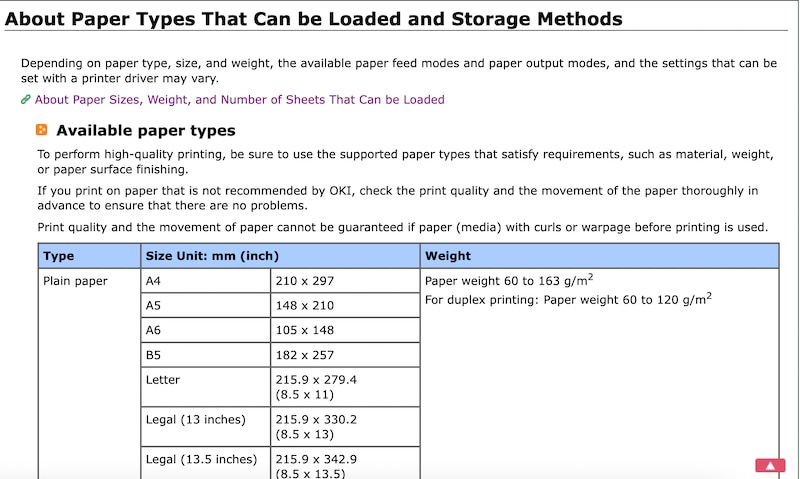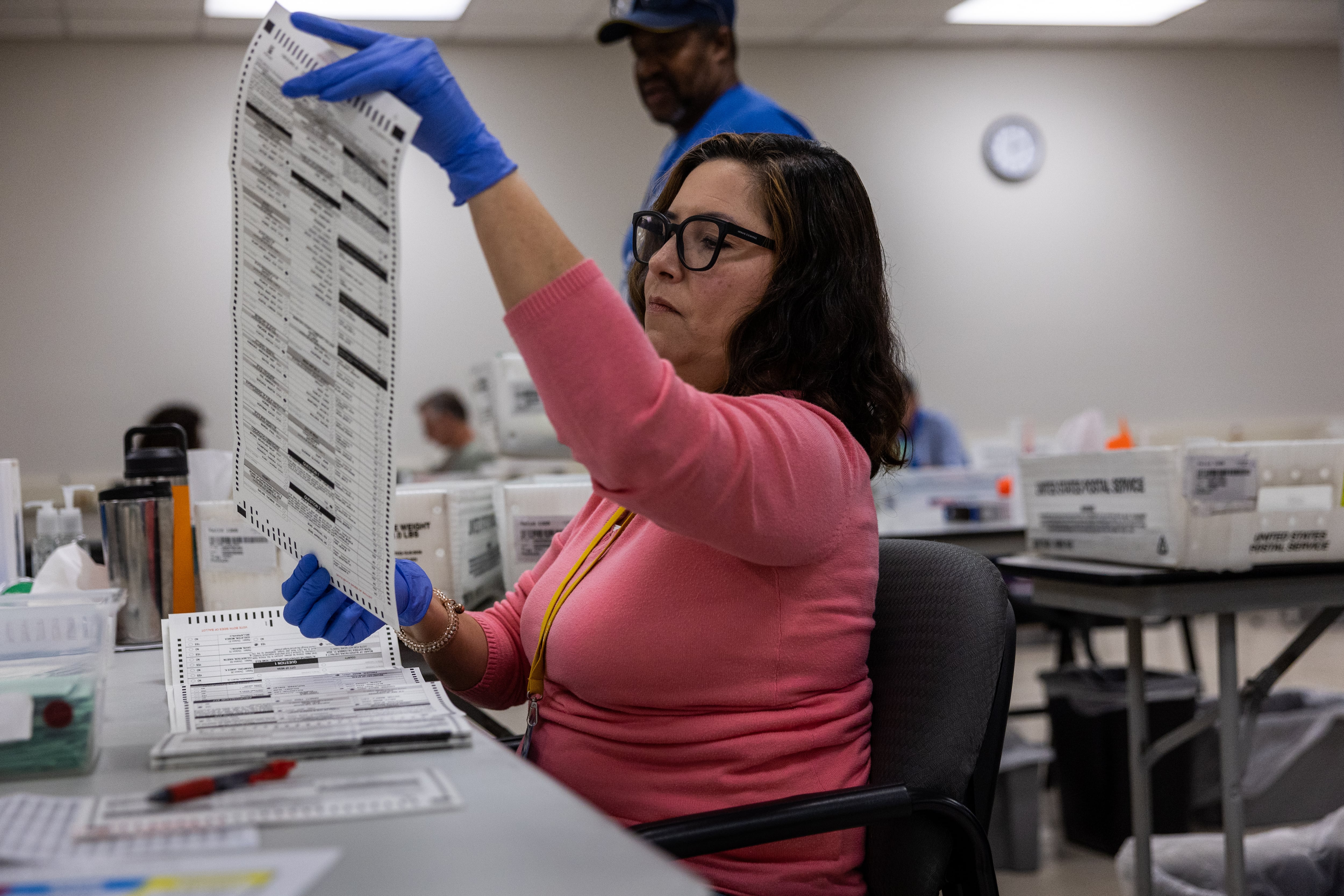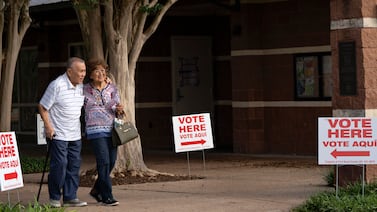Votebeat is a nonprofit news organization reporting on voting access and election administration across the U.S. Sign up for our free newsletters here.
One big question Maricopa County voters had after many had trouble casting ballots at polling places in November’s election was whether county leaders should have seen the problem coming.
The county continues to insist that there’s no way it should have known certain ballot printers would fail during Election Day voting. But the company that made those printers, OKI, argues that its printer manual was clear that these retail-grade printers were not cut out for the job Maricopa subjected them to — and the county should have contacted the company ahead of time to check.
In an internal report released to Votebeat on Wednesday, the county’s election officials again maintain they had no indication the printers would struggle to print on the thicker ballot paper used in November. They wrote in the 16-page report that the problems didn’t show up in pre-election testing or during early voting, and the manual for the printers gave “conflicting information” about which types of paper the printers could handle.
The OKI printers that failed were inexpensive printers that the county and its supplier, Runbeck Election Services, had retrofitted. The printers were originally used to print ballot envelopes, then altered by adding longer trays to accommodate 20-inch, 100-pound cardstock ballots.
OKI says its manual for the printers is clear that you can’t use them to print double-sided on such thick paper, according to two letters the company recently sent to the Maricopa County Attorney’s Office. Votebeat reported as much in December after speaking to numerous election technology experts about what caused the faint and flaking toner that the on-site ballot tabulators then could not read.
The company points to two places in the manual that mention this limitation, stating OKI “remain(s) concerned that it may have been overlooked.”
“A more thorough review of the manual (or consultation directly with an OKI representative) before the election would have provided a clear indication that the media being utilized did not meet specifications for the B432,” OKI wrote in its second, letter, dated July 12.
The diminished print quality caused the ballot tabulators to reject ballots in nearly a third of voting locations across the county, creating delays for voters. The ballots that the on-site machines wouldn’t accept were eventually tabulated at the county’s central headquarters. But the damage was done — the problems added to distrust of the county’s elections and gave fuel to GOP candidates trying to prove that the election had been stolen from them.
The county has shared some of its internal findings over time, in court hearings or updates to county supervisors, since the election aftermath, but not a full review. For months the county refused to provide Votebeat the internal report or share any details about it, saying Elections Director Scott Jarrett was still working on it, and therefore the draft was exempt from disclosure under Arizona’s public records law. It handed over the report only after Votebeat sent a letter from lawyer David Bodney warning that the county was inappropriately withholding the document.
Clarity of OKI manual disputed
OKI has been asking Maricopa County for months now to issue sweeping corrections to an independent report about the Election Day problems written by retired Arizona Supreme Court Chief Justice Ruth McGregor.
The County Attorney’s Office hired McGregor in January to complete the independent review, separate from the internal investigation that was underway. The office paid her and her subcontractors about $102,000 to study the problems, according to invoices obtained by Votebeat.
McGregor wrote in the report published April 10 that “despite the assurances of the manufacturer, many of the OKI B432 printers were not capable of printing 20-inch ballots on 100-pound paper under election-day conditions.”
OKI says that it gave no such assurances. Company spokesperson Lou Stricklin told Votebeat that the county did not reach out to the company, before or after the election to see if the ballot paper would work in the printers — and McGregor did not either, when conducting her independent review.
The county has said it relied on the manual prior to the election when making paper choices. The County Attorney’s Office said that McGregor didn’t contact OKI because her review was meant to be independent, not influenced by people or companies with stake in the outcome. But McGregor did interview Jarrett.
OKI, in its initial May 1 letter to the County Attorney’s Office, called McGregor’s report “irresponsible.”
“It seems that the true underlying cause of the election issues was the use of 100 lb. paper without reviewing the manual and/or confirming with OKI that such use was within the specifications of the OKI B432 printers,” OKI wrote.

The company believes its reputation is at stake, according to the letter, stating that McGregor’s report may “be used by OKI’s competitors to discredit and create doubts in the minds of other election officials that rely on OKI printers.”
The company emphasized that its printers have been successfully used in elections for many years. Until recently, when the company stopped selling the printers in the U.S., OKIs were a favorite inexpensive and reliable printer for election officials across the country, according to several election technology experts.
County Attorney Rachel Mitchell wrote back that she didn’t see the McGregor report as “placing blame” on the printers, “but rather that “the Election Department unwittingly pushed its Oki B432 printers to the limits of their ability,” according to a letter obtained by Votebeat through a records request.
Mitchell wrote that she wanted to put the issue in perspective, explaining that while “it is regrettable anytime a voter is inconvenienced,” there wasn’t “a massive failure of printers” as only some did not print high-quality ballots. About 250,000 voters cast ballots on Election Day, and only about 16,724 couldn’t be tabulated initially at polling places — some of them for other reasons, such as another printing error that happened on a smaller scale that shrunk ballot images.
Mitchell did push back about the manual, though. She pointed out a line for custom printing that explains that up to about 110-pound paper can be used in the custom setting, which the county was using, and that section doesn’t note anything about a potential inability to print on both sides.
The internal report released Wednesday emphasizes the same line.
Both reports suggested the county replace the OKIs with more robust industrial printers, which county officials have already said they plan to do.
Jen Fifield is a reporter for Votebeat based in Arizona. Contact Jen at jfifield@votebeat.org.






